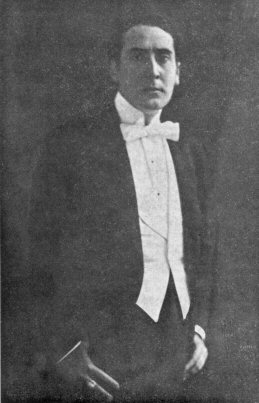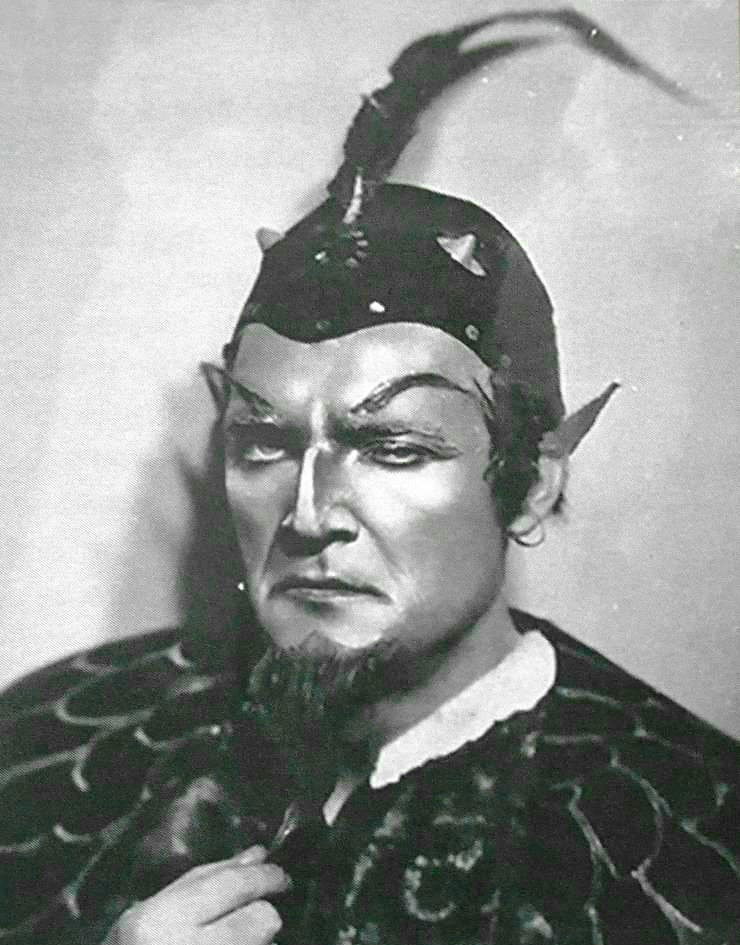|
Allow Me, Daddy!
''Allow Me, Daddy!'' ( it, Mi permette, babbo!) is a 1956 Italian comedy film directed by Mario Bonnard. Plot Rodolfo, a young man with the ambitions of an opera singer in the bass register, does not work, gets up at midday and lives on the shoulders of his butchers in-laws, who keep his singing studies with a profiteer teacher. Finally, he is cornered by his father-in-law, who expects him to work, as a singer or with any other occupation. The teacher, for fear of losing the profit, arranges for Rodolfo to be hired for just one evening in the small part of Doctor Grenvil in La traviata. Rodolfo, after having created problems in the rehearsals, executes, in general disapproval, the phrase "Consumption does not grant her but a few hours" lowering it by an octave, reaching low C, and furthermore, advancing to the proscenium while the curtain falls. He closes behind him, sings the phrase: «It's off!», not foreseen since, although present in the score, it is traditionally omitted. ... [...More Info...] [...Related Items...] OR: [Wikipedia] [Google] [Baidu] |
Mario Bonnard
Mario Bonnard (24 December 1889 – 22 March 1965) was an Italian actor and film director. Bonnard was born and died in Rome. He began his cinematic career as an actor becoming a popular romantic lead in numerous silent films made before World War I. In 1917 he ventured into film directing for the first time. Before the arrival of sound films he worked for a period in Germany in films directed by Luis Trenker. Back in Italy in 1932, he became a prolific director working with the major stars of the time as: Assia Noris, Elsa Merlini, Amedeo Nazzari, Luisa Ferida, Henry Viarisio. ''Il feroce Saladino'' (1937) was the most popular of his films of the 1930s. During the war he continued to work. In the post World War II period his films, ranging from comedies to period dramas enjoyed much success. However, today he's no longer well known. One of his last films was ''The Last Days of Pompeii'' (1959). An illness made him leave production early, so the film was completed by Sergio Leo ... [...More Info...] [...Related Items...] OR: [Wikipedia] [Google] [Baidu] |
Renato Navarrini
Renato Navarrini (1892–1972) was an Italian stage and film actor.Verdone p.101 He was married to the actress Fanny Marchiò. Partial filmography * ''La tavola dei poveri'' (1932) * ''Un cattivo soggetto'' (1933) * ''Lohengrin'' (1936) - Il direttore dell'hotel * ''Pietro Micca'' (1938) - Agostino di Sale * ''Tutta la vita in una notte'' (1938) - (uncredited) * ''Veneno do Pecado'' (1938) - (uncredited) * ''Fuochi d'artificio'' (1938) - (uncredited) * ''Fanfulla da Lodi'' (1940) * ''Giuliano de' Medici'' (1941) - Il poliziano * ''Il signore a doppio petto'' (1941) * '' Marco Visconti'' (1941) * '' The Mask of Cesare Borgia'' (1941) * ''The Pirates of Malaysia'' (1941) * ''L'ultimo addio'' (1942) * '' A Pistol Shot'' (1942) - Il capitono Ivanov (uncredited) * ''La bella addormentata'' (1942) * ''Il fanciullo del West'' (1942) * ''Jealousy'' (1942) - L'avvocato dell' accusa * ''The Woman of Sin'' (1942) * ''Mater dolorosa'' (1943) * ''Tempesta sul golfo'' (1943) - Ceremoniere di c ... [...More Info...] [...Related Items...] OR: [Wikipedia] [Google] [Baidu] |
Films With Screenplays By Ruggero Maccari
A film also called a movie, motion picture, moving picture, picture, photoplay or (slang) flick is a work of visual art that simulates experiences and otherwise communicates ideas, stories, perceptions, feelings, beauty, or atmosphere through the use of moving images. These images are generally accompanied by sound and, more rarely, other sensory stimulations. The word "cinema", short for cinematography, is often used to refer to filmmaking and the film industry, and to the art form that is the result of it. Recording and transmission of film The moving images of a film are created by photographing actual scenes with a motion-picture camera, by photographing drawings or miniature models using traditional animation techniques, by means of CGI and computer animation, or by a combination of some or all of these techniques, and other visual effects. Before the introduction of digital production, series of still images were recorded on a strip of chemically sensitize ... [...More Info...] [...Related Items...] OR: [Wikipedia] [Google] [Baidu] |
Italian Comedy Films
Italian(s) may refer to: * Anything of, from, or related to the people of Italy over the centuries ** Italians, an ethnic group or simply a citizen of the Italian Republic or Italian Kingdom ** Italian language, a Romance language *** Regional Italian, regional variants of the Italian language ** Languages of Italy, languages and dialects spoken in Italy ** Italian culture, cultural features of Italy ** Italian cuisine, traditional foods ** Folklore of Italy, the folklore and urban legends of Italy ** Mythology of Italy, traditional religion and beliefs Other uses * Italian dressing, a vinaigrette-type salad dressing or marinade * Italian or Italian-A, alternative names for the Ping-Pong virus, an extinct computer virus See also * * * Italia (other) * Italic (other) * Italo (other) * The Italian (other) The Italian may refer to: * ''The Italian'' (1915 film), a silent film by Reginald Barker * ''The Italian'' (2005 film), a Russian film b ... [...More Info...] [...Related Items...] OR: [Wikipedia] [Google] [Baidu] |
1956 Comedy Films
Events January * January 1 – The Anglo-Egyptian Condominium ends in Sudan. * January 8 – Operation Auca: Five U.S. evangelical Christian missionaries, Nate Saint, Roger Youderian, Ed McCully, Jim Elliot and Pete Fleming, are killed for trespassing by the Huaorani people of Ecuador, shortly after making contact with them. * January 16 – Egyptian leader Gamal Abdel Nasser vows to reconquer Palestine. * January 25– 26 – Finnish troops reoccupy Porkkala, after Soviet troops vacate its military base. Civilians can return February 4. * January 26 – The 1956 Winter Olympics open in Cortina d'Ampezzo, Italy. February * February 11 – British spies Guy Burgess and Donald Maclean resurface in the Soviet Union, after being missing for 5 years. * February 14– 25 – The 20th Congress of the Communist Party of the Soviet Union is held in Moscow. * February 16 – The 1956 World Figure Skating Championships open in Garmisch, West Germany. * February 22 � ... [...More Info...] [...Related Items...] OR: [Wikipedia] [Google] [Baidu] |
1956 Films
Events January * January 1 – The Anglo-Egyptian Sudan, Anglo-Egyptian Condominium ends in Sudan. * January 8 – Operation Auca: Five U.S. evangelical Christian Missionary, missionaries, Nate Saint, Roger Youderian, Ed McCully, Jim Elliot and Pete Fleming, are killed for trespassing by the Huaorani people of Ecuador, shortly after making contact with them. * January 16 – Egyptian leader Gamal Abdel Nasser vows to reconquer Palestine (region), Palestine. * January 25–January 26, 26 – Finnish troops reoccupy Porkkala, after Soviet Union, Soviet troops vacate its military base. Civilians can return February 4. * January 26 – The 1956 Winter Olympics open in Cortina d'Ampezzo, Italy. February * February 11 – British Espionage, spies Guy Burgess and Donald Maclean (spy), Donald Maclean resurface in the Soviet Union, after being missing for 5 years. * February 14–February 25, 25 – The 20th Congress of the Communist Party of the Soviet Union is held in Mosc ... [...More Info...] [...Related Items...] OR: [Wikipedia] [Google] [Baidu] |
Afro Poli
Afro Poli (22 December 1902 in Pisa – 22 February 1988 in Rome) was an Italian operatic baritone, particularly associated with the Italian repertory. Kutsch, Karl J. and Riemens, Leo (2004)"Poli, Afro" ''Großes Sängerlexikon'' 4th Edition, Vol. 1, p. 3715. Walter de Gruyter. Life and career Poli began his vocal studies when he joined the "Società Corale Pisana" in 1925, where he was a pupil of Bruno Pizzi. He made his stage debut in 1927 at the Teatro Verdi in Pisa, as Germont. He then went to Milan to further his studies with Gino Neri, and later joined the Teatro dell'Opera di Roma in 1930. He was a leading baritone at La Scala in Milan from 1937 to 1955, where he sang in a wide repertoire from Mozart to verismo, including; ''Le nozze di Figaro'', ''Così fan tutte'', ''Il barbiere di Siviglia'', ''Lucia di Lammermoor'', ''Rigoletto'', '' Simon Boccanegra'', '' L'amico Fritz'', ''Manon Lescaut'', ''La bohème'', ''Tosca'', ''Adriana Lecouvreur'', as well as Italian ... [...More Info...] [...Related Items...] OR: [Wikipedia] [Google] [Baidu] |
Rosanna Carteri
Rosanna Carteri (14 December 193025 October 2020) was an Italian soprano, primarily active from the 1950s through the mid 1960s. After her debut in Rome at age 19 as Elsa in Wagner's ''Lohengrin'', she appeared in leading roles internationally, based at La Scala in Milan. She participated in world premieres such as the title role of Pizzetti's '' Ifigenia''. Life and career Rosanna Carteri was born in Verona and raised in Padua. She studied with Ferrucio Cusinati and started singing in concert at the age of twelve. She won a RAI singing contest in 1948 which led to her operatic debut at the Baths of Caracalla in Rome as Elsa in Wagner's ''Lohengrin'' in 1949, aged only 19. She made her La Scala debut in Milan in 1951 in the title role of Piccinni's ''La buona figliuola'', directed by Giorgio Strehler. She first sang at the Salzburg Festival as Desdemona in Verdi's ''Otello'' in 1952, conducted by Wilhelm Furtwängler, and at the San Francisco Opera as Mimi in Puccini's ''La ... [...More Info...] [...Related Items...] OR: [Wikipedia] [Google] [Baidu] |
Giulio Neri
Giulio Neri (21 May 1909, Torrita di Siena - 21 April 1958, Rome) was an Italian operatic bass, particularly associated with the Italian repertory. Neri studied first in Florence with Ferraresi, and completed his studies in Rome. He made his stage debut in 1935, at the Teatro delle Quattro Fontane in Rome, where he sang mostly comprimario roles. He then joined the Rome Opera in 1938, where he quickly established himself as one of the leading basses of his generation. He sang throughout Italy, making his La Scala debut in 1941. After the war he began appearing abroad, notably at the Royal Opera House in London, the Liceo in Barcelona, the Bavarian State Opera in Munich, the Teatro Colón in Buenos Aires, etc. He sang most of the great bass roles in opera by Verdi and some Wagner, such as Sparafucile, Ferrando, Fiesco, Padre Guardiano, Grand Inquisitore, Ramfis, King Heinrich, King Marke, Gurnemanz, etc. Other notable roles included; Oroveso, Alvise and Mefistofele, one of ... [...More Info...] [...Related Items...] OR: [Wikipedia] [Google] [Baidu] |




